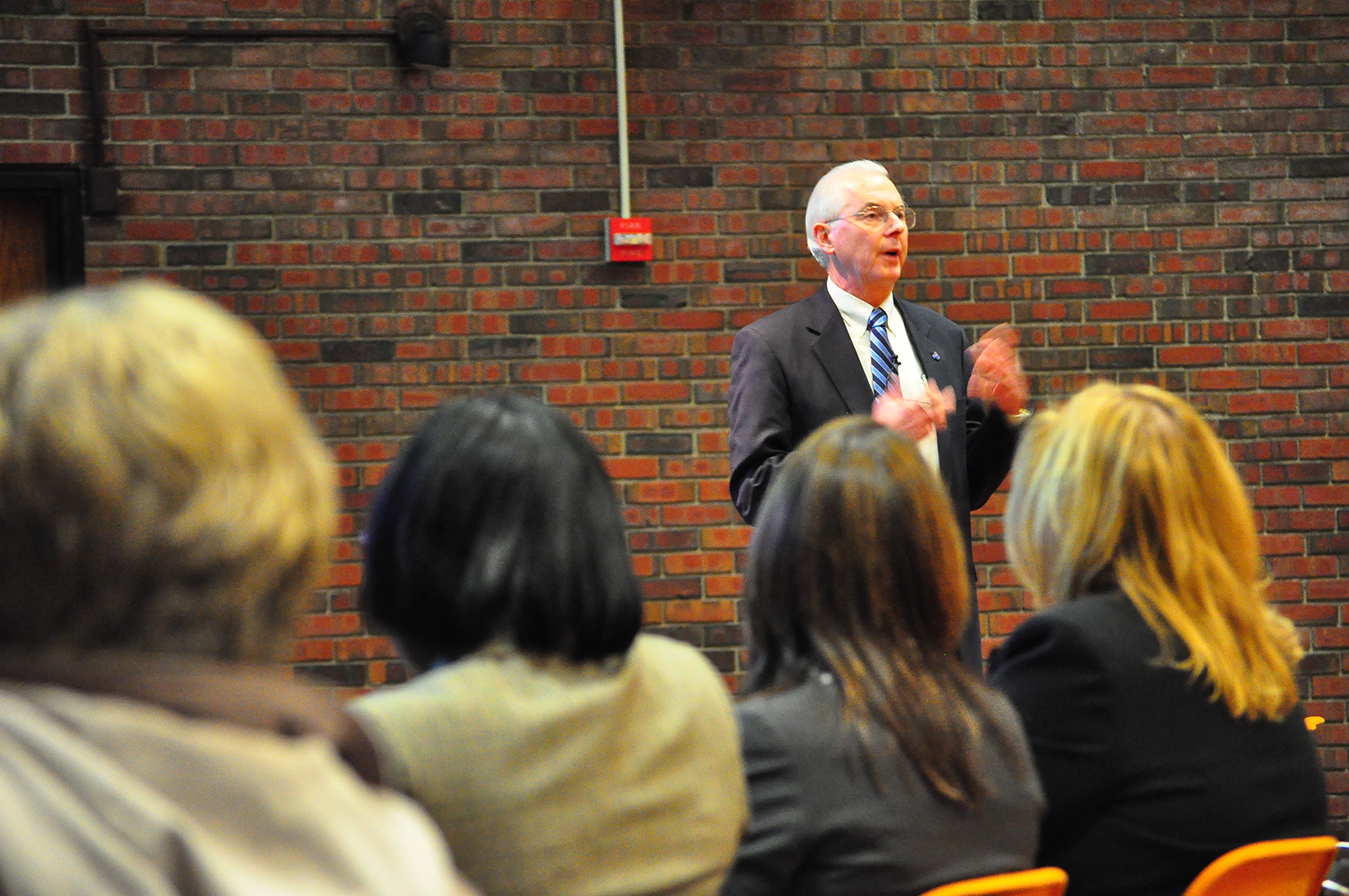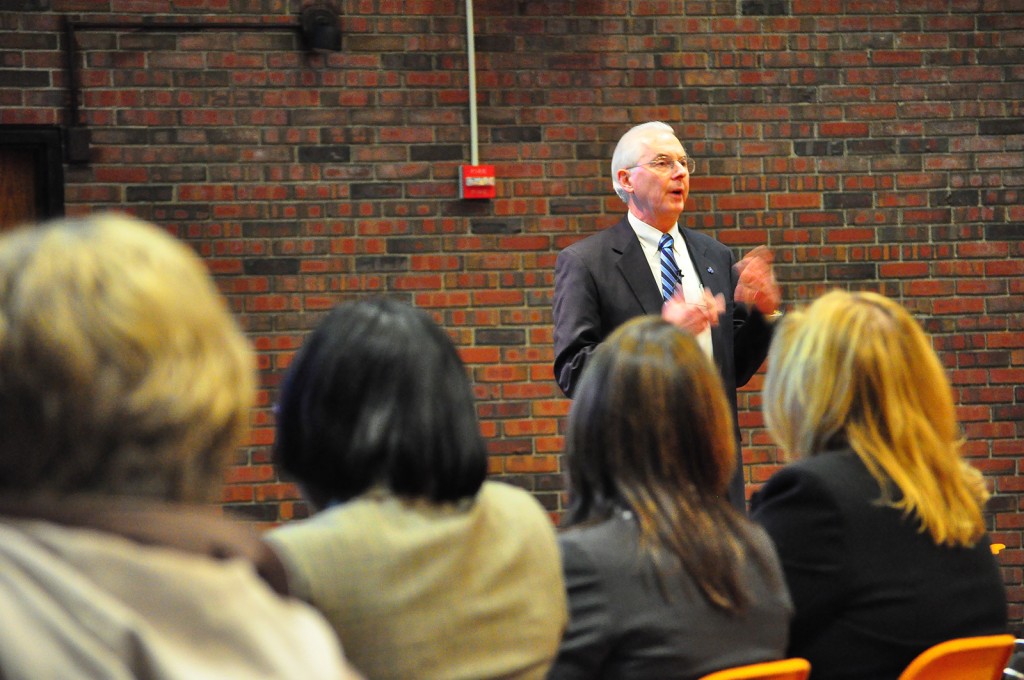

Though Interim President Donald Christian said plans for reduction have not been finalized, members of the faculty at SUNY New Paltz said they’ve already been asked to cut part-time faculty budgets and other expenses next year to help meet the college’s $3.2 million budgetary shortfall.
Vice President for Finance and Administration Jackie DiStefano said the college would save a total of $2,337,153 if the suggestions made to date for reduction are carried out, with a $386,584 instructional budgetary reduction and $1,950,569 in non-instructional cuts. She said one proposal that has been discussed would create a reduced reliance on part-time faculty, with $239,150 in instructional savings suggested in this area. According to Christian, “back of the envelope calculations” indicate each three-credit course taught by an adjunct costs approximately $3,000.
Potential cuts to adjunct faculty budgets were laid out in at least one e-mail obtained by The New Paltz Oracle last month. In that e-mail, the English and psychology departments were listed to be expected to cut the number of credits offered by part-time faculty by 30, with 12 credits listed for the anthropology department, 15 in communication and media, 18 in history, 21 in sociology and nine in philosophy. These are six of the 16 departments within the College of Liberal Arts and Sciences.
Christian said the campus community should note that though program elimination is also “not entirely off the table” and that class sizes will likely increase, administrators are looking at ideas for changes over the next five months with the college’s future in mind.
“The things that we have been looking at are examples. None of these are cast in stone,” he said. “We are not asking people to take any actions at this point.”
Christian was joined by DiStefano Wednesday when the pair hosted a forum to share preliminary plans for economizing in light of the deficit, which they said resulted from cuts in state support and other factors. Reductions made possible by consolidation of activities within certain offices at the college and those enabled by an early retirement incentive offered by the state’s government were explained, in addition to a draft of “suggestions requiring further action to implement.”
Administrators scaled back on Other Than Personnel Services (OTPS) costs in the last round of budget cuts, Christian said. He said with 87 percent of the budget currently tied to personnel costs and a long term plan for reducing reliance on adjuncts, cutting costs in part-time faculty budgets is something the deans are looking into.
But when Yvonne Aspengren, a professor of foreign language and the vice president for part-timers of the New Paltz chapter of United University Professions, asked if administrators were willing to share the extent of specific proposals for different departments, Christian declined.
“I don’t know that there’s any profit in sharing those,” the interim president said. “We may need to go back and refine them.”
English Department Chair Thomas Olsen said his unit has been asked to cut 30 credit hours in the next academic year, which he said amounts to just under a $31,000 reduction in the department’s part-time faculty budget.
“We will have to reduce our number of sections by 10 over the year to achieve the 30-credit cut,” he said. “How this will affect part-time faculty positions is not yet clear, since that depends on how we decide to make up the shortfall. But certainly we will not be able to hire as many teachers as we did last year, which was already a very lean, austerity-minded year.”
Olsen said he has also been asked to cut $5,000 in the department’s student worker budget and $5,000 in supplies and contracts. Though he said he does not feel programs within his department are being targeted for elimination, he is concerned that others will be as the planning process continues.
James Schiffer, the dean of the College of Liberal Arts and Sciences, said his sector has “not specifically” been asked to reduce part-time faculty budgets. According to Schiffer, ideas proposed for this unit were made in consultation with department chairs after each department faculty met and then shared its ideas for economizing and generating revenue.
The dean said official decisions have not yet been made.
But Brian Obach, the chair of the sociology department, said his program will likely offer three or four fewer classes each semester next year and that some adjunct faculty will not be rehired. He said the future cuts are regrettable for several reasons.
“Students may have a harder time getting the classes that they need, and we won’t be able to employ some adjunct faculty who have served us well in the past,” he said. “Everyone here is seeking ways to ensure that we can still fulfill our fundamental mission to provide our students with a high quality, affordable education. But the scale of the budget cuts that SUNY has been dealt is sure to have some impact.”
Some students who attended Wednesday’s forum said they and their peers have not taken enough time to educate themselves about fiscal issues affecting the New York State, SUNY and their own college.
Katie Cole, a second-year communication disorders major, said she was embarrassed by the low student turnout at the forum in which information about the school’s budget was being shared.
“I think most of us didn’t know it was happening. We all need to care a little bit more,” she said. “But I also think students will care more if more information is put on the table.”
Christian said he and other administrators have explained budgetary matters to members of the Student Association (SA) executive board in several meetings this semester. SA’s Vice President of Academic Affairs and Governance Caitlin Ryan said these matters were hard for student leaders to understand completely as well, so they hope to host a forum in which the budget planning process is explained in layman’s terms.
While she said she feels administrators should reach out to the student body about concerns surrounding the deficit, she feels it also falls to student leaders to reach out to their peers about these issues.
“We have to step our game up,” she said.
Administrators will meet again to discuss the budget plan on Feb. 15, 2011. According to the budget process timeline outlined on budget.newpaltz.edu, the president’s cabinet will develop a proposal on March 15, 2011, with “affected parties” set to be notified about the plan on April 22, 2011. An anonymous e-mail suggestion system will also be set up in the near future, DiStefano said.
Christian said he hopes more ideas will come forward about generating revenue and that no one wants to institute cutbacks.
“We have a $3.2 million budget gap. That’s $3.2 million that we won’t have to spend next year, or the next year, or the next year or the next year,” he said. “Therefore, we have to make an adjustment in our expenditures. The choices for doing that are fairly limited.”
